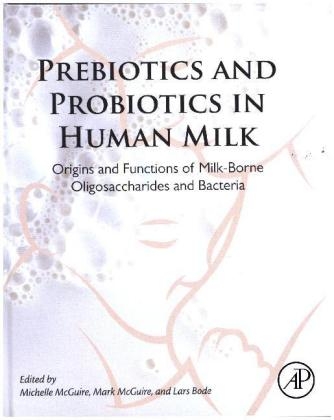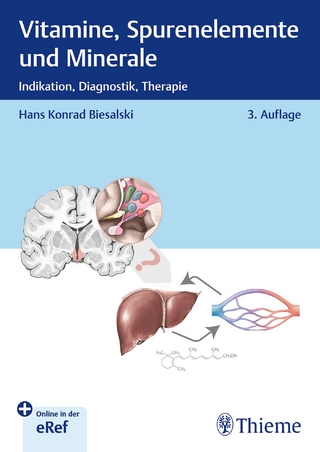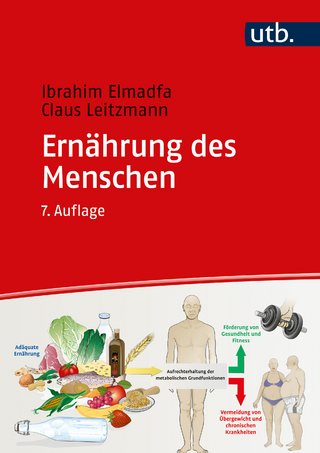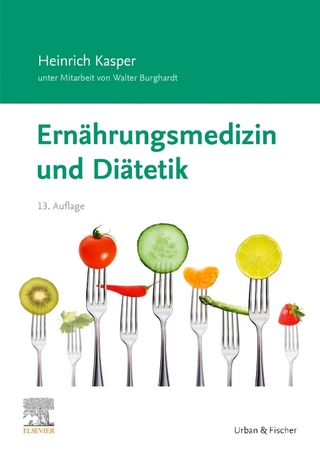
Prebiotics and Probiotics in Human Milk
Academic Press Inc (Verlag)
978-0-12-802725-7 (ISBN)
The book examines how HMOs and bacteria in human milk may function independently and coordinately to influence both maternal and infant health. Human milk is the only food “designed specifically to nourish humans, indeed representing the essence of a perfect “functional food. And although researchers have been studying its composition for decades, surprisingly little is really understood about the origins and functions of its myriad components, an area that is especially true for HMOs and bacteria.
This book provides a thorough review of the newest research on these inter-related milk constituents as written by a team of experts from both academia and industry who actively conduct HMO and human milk microbiome research as they endeavor to apply this new knowledge to infant nutrition. Each chapter provides objective rationale for what research is still needed in this rapidly evolving area, also discussing the challenges and opportunities faced by the industry in adding HMO and microbes to infant food products.
This book is a valuable resource for nutrition researchers focused on infant nutrition, food scientists and product developers working on infant formula, and clinicians interested in broadening their understanding of the benefits of human milk for infants.
Dr. McGuire is an Associate Professor in the School of Biological Sciences at Washington State University specializing in lactation physiology and nutrition. A member of the faculty at WSU since 1995, she has focused on understanding how maternal diet influences milk composition and infant nutrition, mostly in the area of biologically-active lipids such as various trans fatty acids and conjugated linoleic acid (CLA). Her research group has provided evidence that maternal consumption of industrially-produced trans fatty acids can cause milk fat depression and that CLA can be synthesized from trans-vaccenic acid in the mammary gland. Dr. Michelle McGuire collaborates with colleague Dr. Mark McGuire to study the human and bovine milk microbiomes. Shelley has been an active member of the American Society for Nutrition (ASN), having served as chair of the Human Milk and Lactation Research Interest Section (RIS), member of the Executive Board, National Spokesperson, and RIS director. She is also a long-standing, active member of the International Society for Research in Human Milk and Lactation (ISRHML), having received its Ehrlich-Koldovsky Award and currently serving as its secretary-treasurer. She is also author of two nutrition textbooks: Nutritional Sciences: From Fundamentals to Foods (in its 3rd edition) and NUTR. Dr. McGuire received her M.S. in Nutritional Sciences from the University of Illinois where she studied the effect of maternal selenium consumption on milk selenium content and her Ph.D. in Human Nutrition from Cornell University where she used animal models to study the interactions among maternal nutritional status, suckling behaviors, and duration of postpartum anovulation. Dr. McGuire is Professor and head of the University of Idaho’s Department of Animal and Veterinary Science, where he not only oversees an active research program but also works closely with the state’s dairy and other commodity industries to promote education and research that will benefit the state, region, and nation in this regard. His research is focused around milk. For instance his studies have described nutritional and metabolic means to enrich milk with conjugated linoleic acid (CLA) and omega-3 fatty acids in both cows and women. He has also conducted research related to how particularly fatty acids might be involved in protection against pathogens that cause mastitis – for instance Staphylococcus aureus. Other work has addressed the effect of exotoxins produced by S. aureus on the response by the mammary gland in its battle against infection. Along with his colleague, Dr. Shelley McGuire, Mark has also become interested in the possibility that milk may be an important source of healthy bacteria for the nursing neonate/infant. Their interdependent, interdisciplinary work shows that milk produced by healthy women contains many types of bacteria, and that this community structure seems to be personalized within a woman. The importance of the milk microbiome to development of the infant gastrointestinal tract and health of the breast are areas under current study. Dr. McGuire is a Council Member on the Executive Committee for the International Society for Research in Human Milk and Lactation (ISRHML), and an active member of many professional societies including the American Dairy Science Association (ADSA), American Society of Animal Science (ASAS), American Society of Microbiology (ASM), and the American Society for Nutrition (ASN). His research has been recognized by ADSA with the Richard M. Hoyt Dairy Research Award and the Agway Inc. Young Scientist award. Originally from Hameln, Germany, Dr. Bode earned his M.S. and Ph.D. in Nutritional Sciences from the Justus-Liebig University Giessen in Germany where he studied the effects of human milk oligosaccharides (HMO) on selectin-mediated cell-cell interactions in the immune system. Dr. Bode completed his post-doctoral fellowship at the Burnham Institute for Medical Research in La Jolla, California, where he made major contributions in elucidating the central role of heparan sulfate proteoglycans and heparin in pathogenesis and therapy of protein-losing enteropathy. Currently an Associate Professor of Pediatrics in-residence in the Division of Neonatology and the Division of Pediatric Gastroenterology, Hepatology and Nutrition, at the University of California, San Diego, Dr. Bode leads a research program focused on elucidating functions and biosynthesis of human milk oligosaccharides. Dr. Bode has served as chair of the Lactation Research Interest Section (RIS) for the American Society for Nutrition (ASN) and as Council Member on the Executive Committee for the International Society for Research in Human Milk and Lactation (ISRHML); he is currently the president-elect of ISRHML. Dr. Bode has received numerous awards including ISRHML’s Ehrlich-Koldovsky Award and ASN’s Bio Serv Award in Experimental Animal Nutrition and Normal Kretchmer Memorial Award in Nutrition and Development.
Section A. Background, Structures, Synthesis, and Analysis
Chapter 1. From Bifidus Factor to Human Milk Oligosaccharides: A Historical Perspective on Complex Sugars in Milk
Chapter 2. Structures, Classification, and Biosynthesis of Human Milk Oligosaccharides
Chapter 3. Oligosaccharides in the Milk of Other Mammals
Chapter 4. Analytical Methods to Characterize Human Milk Oligosaccharides
Section B. Potential Functions and Benefits
Chapter 5. Oligosaccharide Metabolism in the Breastfed Infant
Chapter 6. The Role of Human Milk Oligosaccharides in Host–Microbial Interactions
Chapter 7. Potential Public Health Impact of Human Milk Oligosaccharides
Chapter 8. Human Milk Oligosaccharides as Modulators of Intestinal and Systemic Immunity
Section C. Challenges and Opportunities
Chapter 9. Making Human Milk Oligosaccharides Available for Research and Application – Approaches, Challenges, and Future Opportunities
Section D. Background, Methods, Origin, and Interpretation
Chapter 10. Isn’t Milk Sterile? A Historical Perspective on Microbes in Milk
Chapter 11. From the Human Milk Microbiota to the Human Milk Metagenome: Evolution of Methods to Study Human Milk Microbial Communities
Chapter 12. Maternal Factors Related to Variability in the Human Milk Microbiome
Chapter 13. The Origin of Human Milk Bacteria
Section E. Human Milk Microbes and Health
Chapter 14. An Evolutionary, Biosocial Perspective on Variation in Human Milk Microbes and Oligosaccharides: An Example of Eco-Homeorhesis?
Chapter 15. Infectious Mastitis During Lactation: A Mammary Dysbiosis Model
Chapter 16. Probiotics During the Perinatal Period: Impact on the Health of Mothers and Infants
Section F. Challenges and Opportunities
Chapter 17. Human Milk Microbes – Summary and Research Gaps
| Erscheinungsdatum | 05.11.2016 |
|---|---|
| Verlagsort | San Diego |
| Sprache | englisch |
| Maße | 191 x 235 mm |
| Gewicht | 1220 g |
| Themenwelt | Medizin / Pharmazie ► Gesundheitsfachberufe ► Diätassistenz / Ernährungsberatung |
| ISBN-10 | 0-12-802725-8 / 0128027258 |
| ISBN-13 | 978-0-12-802725-7 / 9780128027257 |
| Zustand | Neuware |
| Haben Sie eine Frage zum Produkt? |
aus dem Bereich


